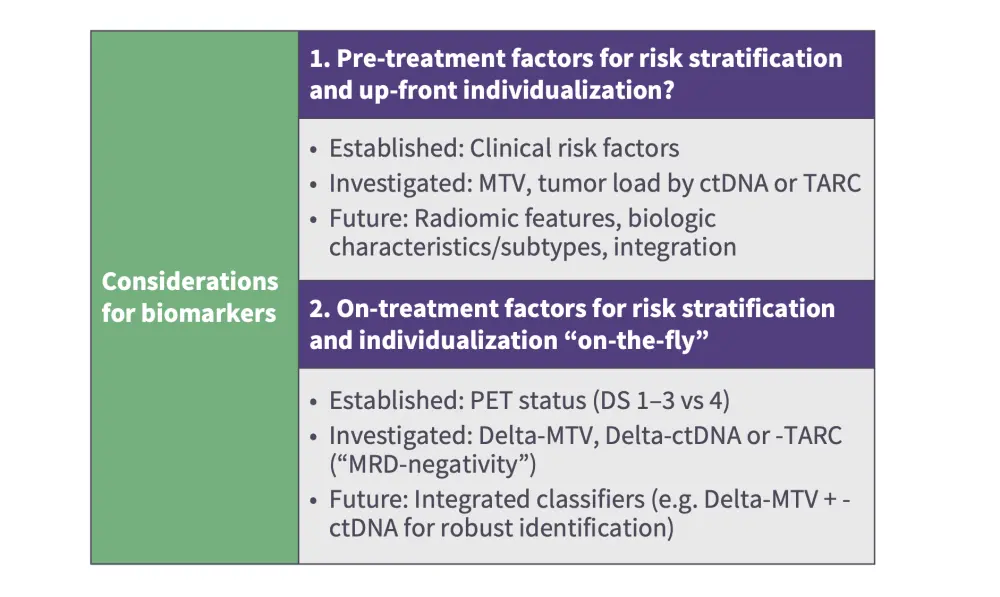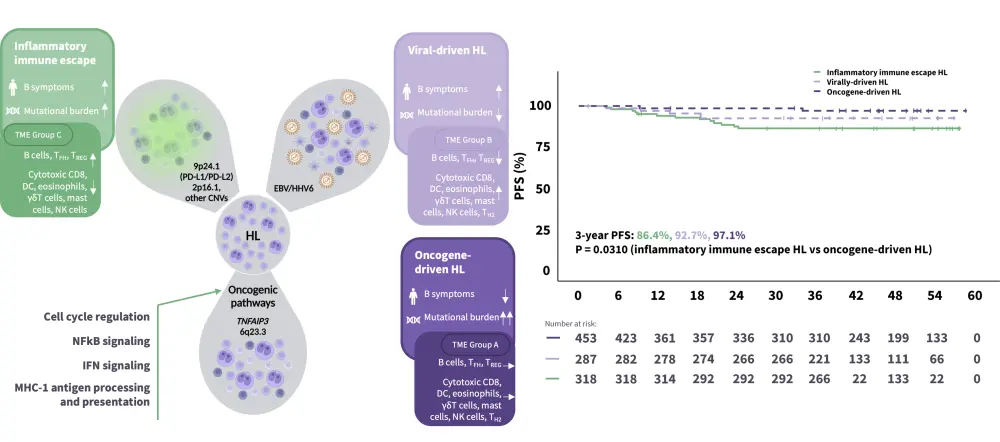All content on this site is intended for healthcare professionals only. By acknowledging this message and accessing the information on this website you are confirming that you are a Healthcare Professional. If you are a patient or carer, please visit the Lymphoma Coalition.
The lym Hub website uses a third-party service provided by Google that dynamically translates web content. Translations are machine generated, so may not be an exact or complete translation, and the lym Hub cannot guarantee the accuracy of translated content. The lym and its employees will not be liable for any direct, indirect, or consequential damages (even if foreseeable) resulting from use of the Google Translate feature. For further support with Google Translate, visit Google Translate Help.
The Lymphoma & CLL Hub is an independent medical education platform, sponsored by AbbVie, BeOne Medicines, Johnson & Johnson, Miltenyi Biomedicine, Nurix Therapeutics, Roche, Sobi and Thermo Fisher Scientific and supported through educational grants from Bristol Myers Squibb, Lilly and Pfizer. Funders are allowed no direct influence on our content. The levels of sponsorship listed are reflective of the amount of funding given. View funders.
Now you can support HCPs in making informed decisions for their patients
Your contribution helps us continuously deliver expertly curated content to HCPs worldwide. You will also have the opportunity to make a content suggestion for consideration and receive updates on the impact contributions are making to our content.
Find out more
Create an account and access these new features:
Bookmark content to read later
Select your specific areas of interest
View lymphoma & CLL content recommended for you
Symposium | Targeted therapies in classic Hodgkin lymphoma: Future perspectives
Featured:
Do you know... In the HD-21 randomized, multicenter, parallel, open-label, phase III trial (NCT02661503), which biologic subtype(s) of classic Hodgkin lymphoma (HL) showed the highest 3-year progression-free survival (PFS) rate with brentuximab vedotin-based BrECADD treatment regimen?
Video series
During the European School of Haematalogy (ESH) 4th How to Diagnose and Treat Lymphoma Conference, the Lymphoma hub held a symposium on November 02, 2024 titled, Treating classic Hodgkin lymphoma (cHL): Spotlight on targeted therapies. Here, we share a presentation by Paul Bröckelmann, University Hospital of Cologne, Cologne, DE, discussing the future perspectives on use of targeted therapies for cHL.
Bröckelmann initiates by highlighting the importance of academic trials to drive progress in the field of cHL. He cites examples from studies by the German Hodgkin Study Group, including the phase II NIVAHL trial (NCT03004833)1 and a phase II trial (NCT01569204),2 where early randomization allowed exploration of different therapeutic strategies to identify optimal approach for pivotal phase III trials.
He shares recent advances in the first-line treatment approaches for advanced-stage HL, including insights from the SWOG S1826 (NCT03907488)3 and HD21 (NCT02661503) trials.4 He then discusses key ongoing phase II trials in the first-line setting, including:
- GHSG INDIE trial (NCT04837859) of positron emission tomography (PET)-guided individualized anti-programmed death 1 (PD1) first-line treatment with tislelizumab in early-stage unfavorable cHL.5
- KEYNOTE-C11 trial (NCT05008224) of PET-adapted sequential pembrolizumab, followed by AVD (doxorubicin, vinblastine, and dacarbazine) or eBEACOPP (escalated doses of bleomycin, etoposide, doxorubicin, cyclophosphamide, vincristine, procarbazine, and prednisone) chemotherapy and pembrolizumab consolidation in newly diagnosed cHL.6
- RATiFY trial (NCT05627115) of PET-guided anti-PD1 plus AVD-based treatment in older patients of any risk group after an initial lead-in with tislelizumab.7
- cHL001 trial (NCT05404945) evaluating the combination of brentuximab vedotin (BV) and pembrolizumab to pursue a fitness-guided approach in older patients of any risk group.8
He goes on to discuss key trials in the relapsed setting, including:
- The phase III MK4280A-008 KEYFORM-008 trial (NCT05508867) of co-formulated pembrolizumab and favezelimab (anti-LAG-3 antibody) vs standard of care chemotherapy in patients with R/R cHL.9
- The phase I PRIMAVERA trial (NCT06137144) of AZD3470 in patients with R/R cHL.10 AZD3470 is a PRMT5 (S-methyl-5′-thioadenosine phosphorylase) inhibitor that is a novel concept to induce cell death in methylthioadenosine phosphorylase (MTAP)-deficient cancer cells, while sparing healthy ones.
Bröckelmann concludes by discussing emerging biomarkers for pre- and on-treatment stratification of patients for more personalized therapeutic approach (Figure 1).
Figure 1. Biomarkers for treatment stratification*

ctDNA, circulating tumor DNA; DS, Deauville score; HL, Hodgkin lymphoma; MRD, measurable residual disease; MTV, metabolic tumor volume; PET, positron emission tomography; TARC, thymus and activation-regulated chemokine.
*Figure provided by Bröckelmann P, with permission.
He shares insights from a study by the German Hodgkin Study Group that used a pre-treatment stratification approach using circulating tumor DNA (ctDNA) sequencing to identify subtypes of HL.11 The results indicated that the stratified biologic clusters were associated with different benefits from a BV-based BrECADD (brentuximab vedotin, etoposide, cyclophosphamide, doxorubicin, dacarbazine, and dexamethasone) regimen in the HD21 trial (Figure 2). Further, on-treatment assessment using ctDNA allowed identification of patients with high risk of relapse.11
Figure 2. Pre-treatment stratification: Biologic subtypes*

BV, brentuximab vedotin; DC, dendritic cell; EBV, Epstein-Barr virus; HHV6, human herpesvirus 6; HL, Hodgkin lymphoma; NK, natural killer; TFH, follicular helper T cells; TH2, T helper cells; TREG, regulatory T cells; PFS, progression-free survival.
*Figure provided by Bröckelmann P, with permission.
Your opinion matters
As a result of my participation in this symposium, I commit to staying aware of the latest clinical trial updates and guidelines for treatment sequencing in patients with cHL and to consider using targeted therapies when appropriate.
This independent educational activity was supported by Takeda. All content was developed independently by the faculty in collaboration with SES. The funder was allowed no influence on the content of the symposium.
References
Please indicate your level of agreement with the following statements:
The content was clear and easy to understand
The content addressed the learning objectives
The content was relevant to my practice
I will change my clinical practice as a result of this content


 Paul Bröckelmann
Paul Bröckelmann

